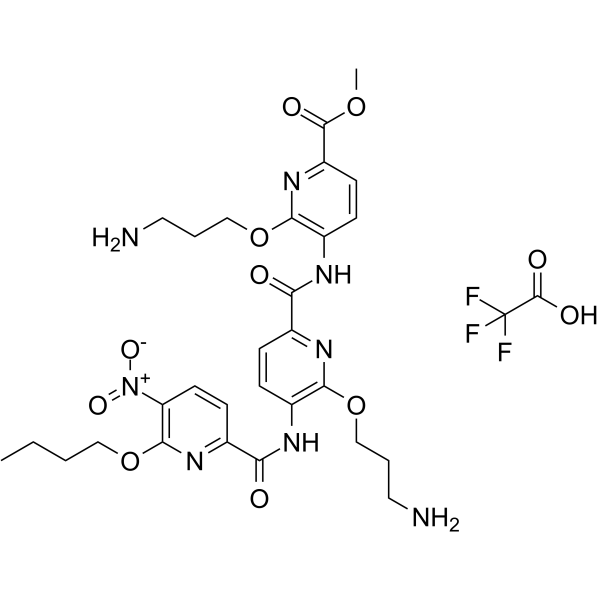ADH-6 TFA |
| Catalog No.GC65880 |
ADH-6 TFA is a tripyridylamide compound. ADH-6 abrogates self-assembly of the aggregation-nucleating subdomain of mutant p53 DBD. ADH-6 TFA targets and dissociates mutant p53 aggregates in human cancer cells, which restores p53's transcriptional activity, leading to cell cycle arrest and apoptosis. ADH-6 TFA has the potential for the research of cancer diseases.
Products are for research use only. Not for human use. We do not sell to patients.

Sample solution is provided at 25 µL, 10mM.
ADH-6 TFA is a tripyridylamide compound. ADH-6 abrogates self-assembly of the aggregation-nucleating subdomain of mutant p53 DBD. ADH-6 TFA targets and dissociates mutant p53 aggregates in human cancer cells, which restores p53's transcriptional activity, leading to cell cycle arrest and apoptosis. ADH-6 TFA has the potential for the research of cancer diseases[1].
ADH-6 (25 μM, 10 h) TFA inhibits aggregation of pR248W (indicated by dot blot assay)[1].
ADH-6 (5 μM, 6 h) TFA dissociates intracellular mutant p53 aggregates in MIA PaCa-2 cells[1].
ADH-6 (0-10 μM, 24 or 48 h) TFA causes selective cytotoxicity in cancer cells bearing mutant p53 (MIA PaCa-2)[1].
ADH-6 (5 μM, 24 h) TFA specifically targets and reactivates aggregation-prone mutant p53 in MIA PaCa-2 cells[1].
Cell Viability Assay[1]
| Cell Line: | MIA PaCa-2 (mutant R248W p53), SK-BR-3 (mutant R175H p53) |
| Concentration: | 0, 2.5, 5, 7.5, 10 μM |
| Incubation Time: | 24, 48 h |
| Result: | Caused death of cancer cells bearing mutant, but not WT, p53. |
Western Blot Analysis[1]
| Cell Line: | MIA PaCa-2 cells |
| Concentration: | 5 μM |
| Incubation Time: | 24 h |
| Result: | Increased expression of p53-inducible MDM2 and proapoptotic Bax. |
ADH-6 (intraperitoneal injection, 15 mg/kg, every 2 days, for a total of 12 doses) TFA causes regression of mutant p53-bearing tumors [1].
| Animal Model: | MIA PaCa-2 xenografts[1] |
| Dosage: | 716.4 µM in 0.02% DMSO |
| Administration: | Intraperitoneal injection, every 2 days, for a total of 12 doses |
| Result: | Reduced tumor growth relative to the saline-treated control group. Reduced mutant p53 levels and shrinked xenografts harboring aggregation-prone mutant p53. |
| Animal Model: | MIA PaCa-2 xenografts (pharmacokinetics assay)[1] |
| Dosage: | 15 mg/kg |
| Administration: | Intraperitoneal injection, for a single dose |
| Result: | Cmax: 21 µg/mL, T1/2: 3.6 h |
Average Rating: 5 (Based on Reviews and 30 reference(s) in Google Scholar.)
GLPBIO products are for RESEARCH USE ONLY. Please make sure your review or question is research based.
Required fields are marked with *




















